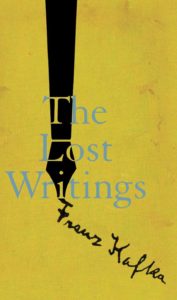
Our basket of brilliant reviews this week includes Hillary Kelly on Rumaan Alam’s Leave the World Behind, Juan Gabriel Vásquez on Phil Klay’s Missionaries, Nathan Goldman on Franz Kafka’s Lost Writings, Lydia Millet on Sayaka Murata’s Earthlings, and Merve Emre on the life and writing of Ingeborg Bachmann.
“… enthralling … Leave the World Behind is a coy little thing: a disaster novel without the disaster … I expected, after all of this, the natural tick-tock of a disaster novel. The invasion or superstorm or missiles would arrive; the characters would run for it; inevitably, some innocent would be sacrificed to the gods who demand such things from novelists. But, although the tension heightens, no such moments arrive. Where other practitioners of the genre revel in chaos—the coarse spectacle of society unravelling—Alam keeps close to his characters, who, like insects in acrylic, remain trapped in a state of suspended unease. This, he suggests, is the modern disaster—the precarity of American life, which leaves us unsure, always, if things can get worse … In most literature of this ilk, the disaster, whether rising seas or a virus, is a force of narrative tension: the reader is keen to learn how humans move from a time of upheaval to one of stability. Alam never gets there; upheaval is all his characters have. His achievement is to see that his genre’s traditional arc, which relies on the idea of aftermath, no longer makes sense. Today, disaster novels call for something different, a recognition that we won’t find a new normal, even if we’ve hoarded our Duracells and tucked ourselves behind sturdy walls in forested hideaways. The catastrophe came long ago, before Amanda went grocery shopping and the Washingtons left Manhattan, and before Clay submitted his latest piece to the Times Book Review. And it isn’t ending, only changing shape.”
–Hillary Kelly on Rumaan Alam’s Leave the World Behind (The New Yorker)
“Klay’s understanding of Colombia, the main theater of war in Missionaries, is the chief source of admiration for this reviewer. There are no simple wars, of course, but the Colombian conflict is as intricate as they come … building a coherent novel out of such chaos-prone material requires order, structure, architecture. Klay is very disciplined, giving his characters regular turns at the microphone to tell their stories before having their paths cross in the novel’s version of hell: a small town in northern Colombia where all the forces of this particular war, including its politics, have come to clash … those who suffer and survive violence are infinitely interesting, and Missionaries is attentive to their internal mechanisms, their social context, their psychological scars, while conceding that their experience is to some degree incommunicable, that language has its limitations … a courageous book: It doesn’t shy away, as so much fiction does, from the real world of local politics, often including real names and events, never making any concessions to a reader’s potential impatience with all things foreign. It never simplifies; it doesn’t even try to streamline the situation. We do feel, however, Klay’s restlessness about how much information to give—and his preoccupation with the adequate tools to give it. This authorial anxiety occasionally leads to problematic narrative choices … But these are minor flaws in a novel notable for its empathy and its curiosity (in the shape of voracious research), and for its cleareyed observation of war in the 21st century … the novel goes on, undeterred, exploring and revealing whole human worlds that would remain inaccessible without it.”
–Juan Gabriel Vásquez on Phil Klay’s Missionaries (The New York Times Book Review)

“If The Lost Writings has contributed to this legacy of Kafkan confusion, it also serves a powerful clarifying function by defamiliarizing the Kafka we think we know. So much of the past century of Kafka scholarship has been consumed with debates about what to make of his desperate, wounded vision—yearning for an absent God, wrestling with the contradictions of modern Jewishness, cowering in fear of the father or a lover, despairing amid an inscrutable bureaucracy, foretelling the approach of totalitarianism—that it can be easy to take for granted the work’s austere strangeness, as if we’ve already understood the experience of awed impotence Kafka conjures. The journey through The Lost Writings unsettles this confidence not only by introducing us to new or less recognizable expressions of his project, but also by putting us into repeated, immediate contact with Kafka’s own self-doubt, which gleams in every bracketed ellipsis, here placed at the end of each piece that cuts off before the final sentence ends. These marks make visible the fourth wall that is implicit in each work Kafka left in some way unfinished, and even in those whose publication he permitted. It’s not only the characters, but Kafka himself who could find no way out. The Lost Writings helps us linger with him, in his impassable doorways.”
–Nathan Goldman on Franz Kafka’s Lost Writings (The Baffler)
“The novel’s tone hovers between deadpan and naïveté: Even in its episodes of violence it has an affectless quality, which we presume is a function of Natsuki’s PTSD from the sexual assault (plus her E.T. origins, of course). Its appeal lies precisely in this tonal flatness—the anthropological distance the narrator maintains from her subjects. Reminiscent of certain excellent folk tales, expressionless prose is Murata’s trademark. If her description of ‘the Factory’ strikes a superficial note, we can ascribe its stripped-down literality to Natsuki’s automaton identity. Extraterrestrials, it seems, are less like living beings than rudimentary robots with limited powers of affective analysis … no need, in Murata’s stories, for a tedious interpretive struggle … Their project of de-acculturating themselves is rendered matter-of-factly, without suspense, since—existing in a half-life of childish patter and reductive reasoning—they didn’t exhibit much tension of personality or emotional intelligence in the first place. But the proposition that we can deconstruct our socialization through an act of will is intriguing and important. Here it comes with a dose of pathos, since these characters don’t possess the conceptual tools to explore with depth or nuance the human nature they’re so focused on rejecting. Their beef with society is the reproductive pressure it exerts; other systemic oppressions that might give a thoughtful alien pause, like widespread inequality and injustice, are of no interest … If the Marquis de Sade were reanimated as a polite Japanese millennial—less French, less political, less relentlessly graphic and less obsessed with feces—he might produce a document like Earthlings … Murata’s presentation of alienation as a natural response to the pressures of conformity may not give us much that wasn’t on offer in, say, European existentialist writing of nearly a century ago. The strength of her voice lies in the faux-naïf lens through which she filters her dark view of humankind: We earthlings are sad, truncated bots, shuffling through the world in a dream of confusion.”
–Lydia Millet on Sayaka Murata’s Earthlings (The New York Times Book Review)

“Ingeborg Bachmann, whose novels cast a pitiless light on the relationship between patriarchy and fascism, was born in 1926 and died in 1973, after she fell asleep smoking and lit herself on fire. At the time, she was working on a novel cycle called the Todesarten, ‘Ways of Dying,’ and the sad, operatic circumstances of her death brought her writing to life with a violence and extremity no one could have anticipated. Her novels The Book of Franza and Requiem for Fanny Goldmann, as well as what she called her ‘imaginary autobiography,’ the surreal and frantic Malina, all end with a woman dying in some suspicious incident—a fall, a disappearance, a sudden illness. Always, the woman’s death is preceded by a betrayal. Always, a man lurks who has treated her with cruelty, injustice, or mere indifference to her well-being. ‘Fascism is the first thing in the relationship between a man and a woman,’ Bachmann declared in an interview given just before her death. While it would be wrong to read her literally, she was not quite speaking figuratively, either. Bachmann, who spent much of her life renouncing her Nazi upbringing, would never have invoked fascism as only a histrionic metaphor—she was no Sylvia Plath, gleefully blackening daddy’s brogues. Today her novels remain unnerving for how desperately they struggle to give visible form to the invisible and private injustices perpetrated by men, to name them with the same certain horror that attends to accusations of fascism … Amassing evidence of men’s bad intentions and their even worse writing, Bachmann’s novels sought restitution for the women whom men had claimed first as their subjects, then as their victims.”
–Merve Emre on the life and writing of Ingeborg Bachmann (The New York Review of Books)
5 Reviews You Need to Read This WeekIn "Book Marks Features"
Five Books about the Civilian Experience of WarIn "5 Books In My Life"
“Soviet life hurt Ludmilla Petrushevskaya into crystalline prose”In "Review of the Day"

